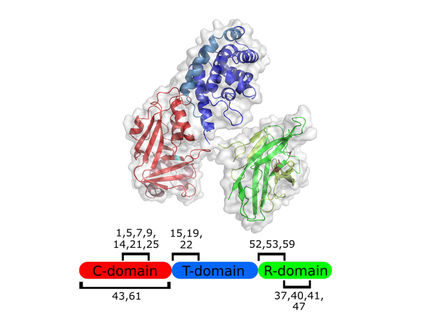Producing medicines in plant seeds
Advertisement
Using plants to produce useful proteins could be an inexpensive alternative to current medicine production methods. Researchers from the Flanders Interuniversity Institute for biotechnology (VIB) at Ghent University have succeeded in producing in plant seeds proteins that have a very strong resemblance to antibodies. They have also demonstrated that these antibody variants are just as active as the whole antibodies that occur naturally in humans. By virtue of their particular action, antibodies are very useful for therapeutic and diagnostic applications. From this research, it is now also clear that these kinds of antibody variants can be used in medical applications and that it is possible to produce them in the seeds of plants, which can have enormous advantages over conventional production methods.
For a number of years now, the VIB researchers in Ghent Bart Van Droogenbroeck, Ann Depicker and Geert De Jaeger have been searching for ways to have plants produce useful proteins efficiently. Plants do offer a lot of advantages over conventional production methods. Because production with plants doesn't require expensive high-tech laboratories, scientists anticipate that, by working with plants, production costs will be 10 to 100 times lower. Another important advantage is that large-scale production is possible without having to make additional investments in expensive fermentors.
Several years ago, Geert De Jaeger and his colleagues succeeded in achieving a high yield of an antibody variant in plants, which had been very difficult to do up to that time. The trick the researchers used was to modify the plants in such a way that they would produce the antibody variant in their seeds. With their special technique, the scientists succeeded in producing seeds in which the desired protein is good for more than one third of the total protein amount. This is a huge proportion compared to other systems normally, scientists succeed in replacing only 1% of the plant's proteins by the desired protein.
The antibody variant that has been produced by Geert De Jaeger and his team has a very simple structure and has only one binding place for a particular substance. Bart Van Droogenbroeck and his colleagues, under the direction of Ann Depicker, are now showing that it is also possible to produce more complex antibody variants in large quantities in the seeds of the Arabidopsis plant. Over 10% of the proteins in the seeds of these plants are the desired antibody variant. As is the case with whole antibodies, these more complex antibody variants have two binding places for a specified substance. This close similarity to whole antibodies makes these antibody variants extremely useful for therapeutic and diagnostic applications.
However, the production of proteins in plants is completed in a different way than in humans. Therefore, to be certain that this different completion process does not affect the effectiveness of the potential medicine; the scientists have subjected the action of the antibody variant to an exhaustive battery of tests. These laboratory tests have shown that the antibody variants produced in plants are just as effective as whole human antibodies in protecting animal cells against infection with the Hepatitis A virus.
Original publication: Van Droogenbroeck et al.; "Aberrant localization and underglycosylation of highly accumulating single-chain Fv-Fc antibodies in transgenic Arabidopsis seeds"; PNAS, 2007.
Other news from the department science
These products might interest you
Most read news
More news from our other portals
See the theme worlds for related content
Topic world Antibodies
Antibodies are specialized molecules of our immune system that can specifically recognize and neutralize pathogens or foreign substances. Antibody research in biotech and pharma has recognized this natural defense potential and is working intensively to make it therapeutically useful. From monoclonal antibodies used against cancer or autoimmune diseases to antibody-drug conjugates that specifically transport drugs to disease cells - the possibilities are enormous

Topic world Antibodies
Antibodies are specialized molecules of our immune system that can specifically recognize and neutralize pathogens or foreign substances. Antibody research in biotech and pharma has recognized this natural defense potential and is working intensively to make it therapeutically useful. From monoclonal antibodies used against cancer or autoimmune diseases to antibody-drug conjugates that specifically transport drugs to disease cells - the possibilities are enormous






















































